Key takeaways:
- Brand loyalty is driven by emotional connections, positive experiences, and ongoing support, rather than just repeat purchases.
- Building brand loyalty results in customer retention, advocacy, resilience against competition, and increased lifetime value, making it crucial for long-term success.
- Key strategies to enhance loyalty include personalized marketing, community building, and exceptional customer service, while challenges such as competition, evolving consumer expectations, and inconsistent service can threaten loyalty.
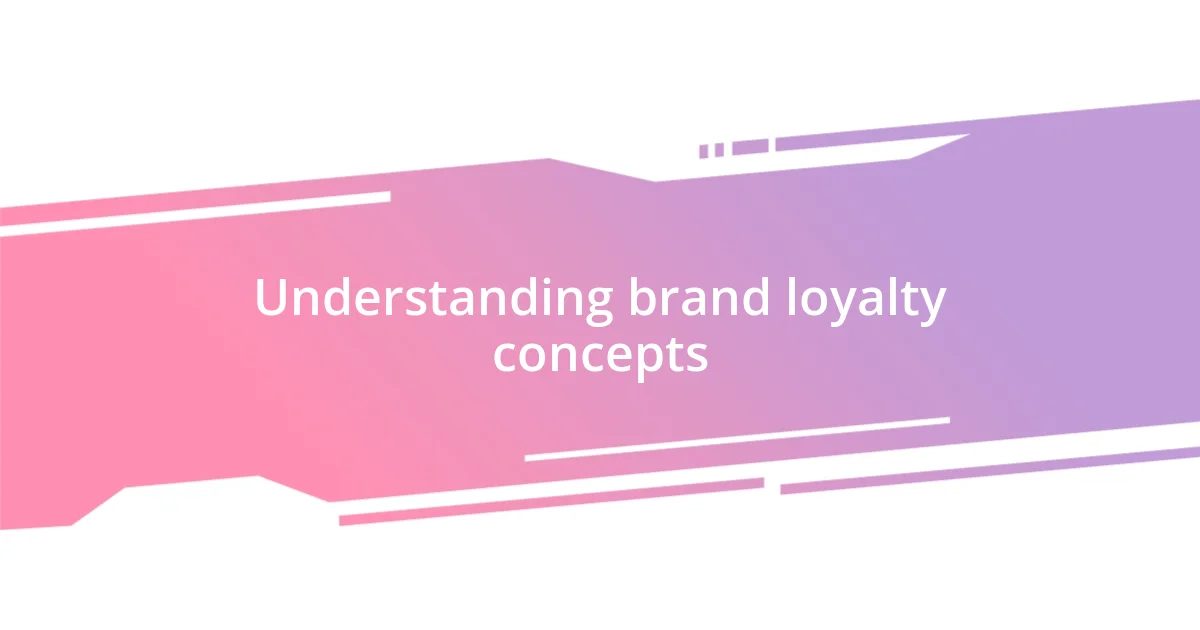
Understanding brand loyalty concepts
Brand loyalty isn’t just about repeat purchases; it’s much deeper than that. I remember when I first discovered a skincare brand that transformed my routine. The feeling of trust I developed for that brand was profound, almost like a friendship built on consistent quality and positive experiences. Have you ever felt that way about a product? It’s this emotional connection that often drives consumer behavior beyond simple transactions.
At its core, brand loyalty involves an attachment that consumers form with a particular brand. I often find myself reaching for that same coffee blend every morning. It’s not just about taste; it’s about routine and the comfort it brings to my day. It’s interesting to explore how brands can foster this sense of belonging and identity in their customers, isn’t it?
Understanding brand loyalty goes beyond knowing your product’s quality. It’s about the overall experience, from your first interaction to ongoing support. I can’t help but think of a local bookstore I frequent. It’s the warm, welcoming environment and the personal touch from the staff that keeps me coming back, not just the books. What strategies do you think companies could use to create that same emotional bond with their customers?
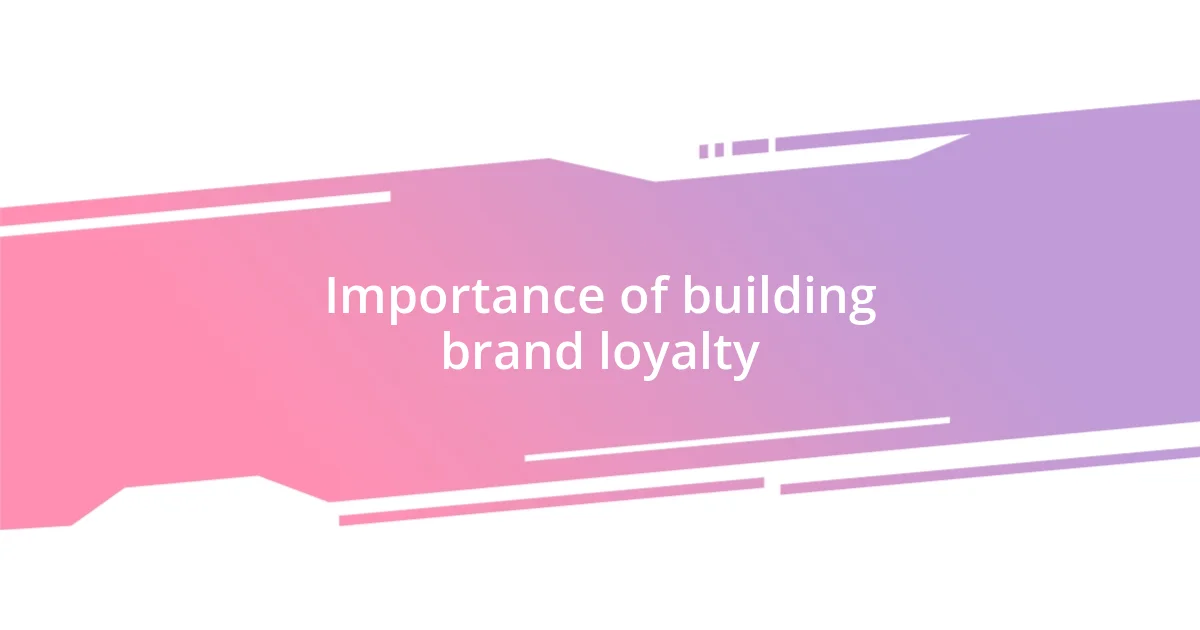
Importance of building brand loyalty
Building brand loyalty is crucial for long-term success in any market. When customers feel loyalty towards a brand, it’s often because they’ve had meaningful interactions that exceed mere transactions. For instance, I recall the excitement I felt when a brand I loved surprised me with a handwritten thank-you note after my purchase. That small gesture transformed my perception of the brand from just a business to something more personal and genuine. It’s the little things that create a lasting impact.
Here are a few reasons why brand loyalty is essential:
- Customer Retention: Loyal customers are more likely to repeat purchases, which significantly reduces marketing costs over time.
- Word-of-Mouth Marketing: Happy customers often become brand advocates, sharing their positive experiences within their social circles.
- Resilience Against Competition: Strong loyalty can shield a brand from price wars and competitors, as devoted customers prioritize emotional ties over costs.
- Feedback Loop: Loyal customers provide valuable feedback about products, helping brands to improve and innovate.
- Increased Lifetime Value: The longer someone remains loyal, the more their overall spending increases, enhancing profitability.
Ultimately, developing brand loyalty is about creating connections and ensuring that every interaction leaves a positive impression.
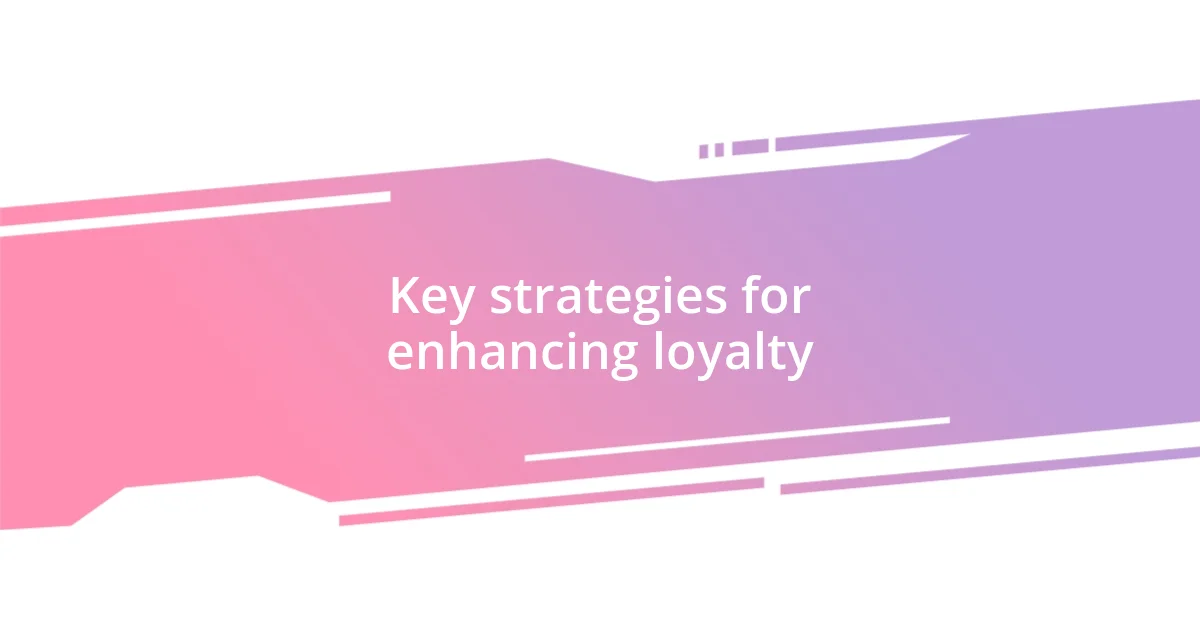
Key strategies for enhancing loyalty
Enhancing brand loyalty requires a multifaceted approach tailored to the needs of your customers. I’ve seen how personalized marketing campaigns significantly impact customer feelings of connection. For example, when a clothing brand I love sends me recommendations based on my past purchases, it’s as if they’re speaking directly to my style preferences. This targeted strategy not only shows that they know me but also keeps me coming back for more, fostering a deeper loyalty.
Another effective strategy is creating a community around your brand. I often participate in online forums of brands I’m passionate about, where users share tips and experiences. This sense of belonging enriches my emotional connection to those brands. By utilizing platforms that encourage customer interaction and feedback, companies can transform casual customers into brand ambassadors who actively share their loyalty with others.
Lastly, delivering exceptional customer service can’t be overlooked. I once had a minor issue with an order, and the company’s prompt and empathetic response made me feel valued. They not only resolved my issue quickly but also offered a discount on my next purchase as an apology. This experience solidified my loyalty and encouraged me to recommend them enthusiastically to friends and family. Engaging customers on this level tends to create memorable experiences that convert them into lifelong advocates.
| Strategy | Description |
|---|---|
| Personalized Marketing | Tailor recommendations based on customer preferences to enhance their shopping experience. |
| Community Building | Create platforms for customers to connect and share experiences, deepening their emotional bond with the brand. |
| Exceptional Customer Service | Provide prompt responses and resolutions to customer issues, reinforcing their value to the brand. |
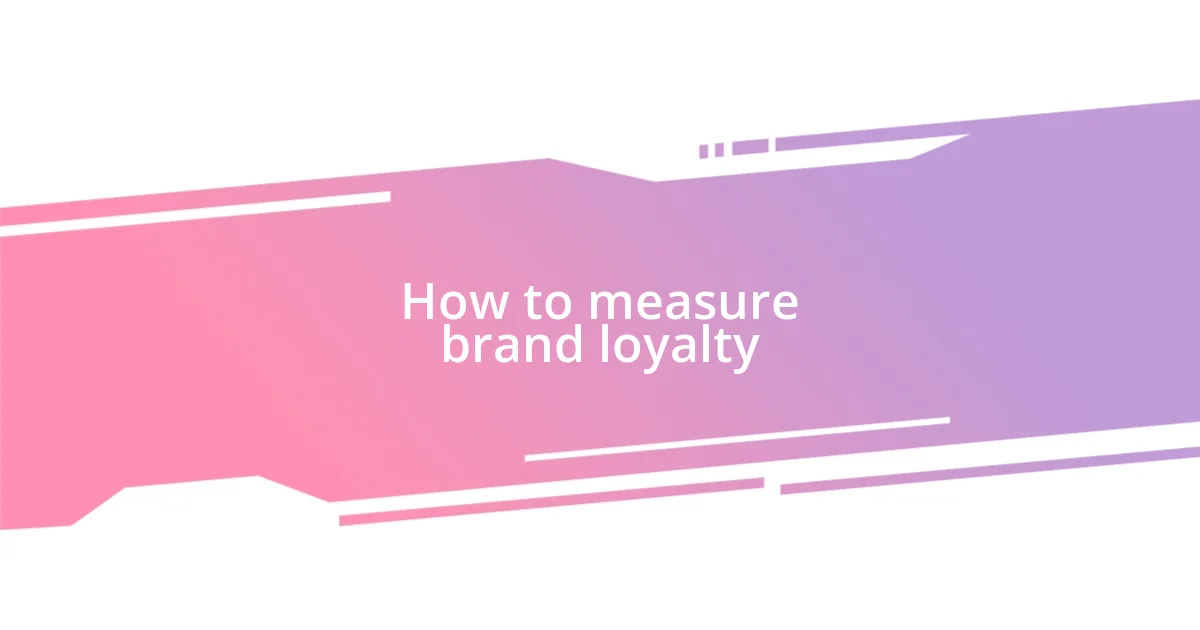
How to measure brand loyalty
Measuring brand loyalty is essential to understanding how customers feel about your brand. One effective method is through customer surveys. I remember when a favorite coffee shop of mine asked for feedback via a quick survey linked to their loyalty program. They genuinely wanted to know how my experience could improve, and this made me feel heard. Surveys provide direct insights into customer satisfaction and areas for improvement.
Another valuable approach is analyzing purchase behavior. Have you ever checked your buying patterns? I find it fascinating when I look back at my shopping habits for a certain brand over the years. Tracking repeat purchases and frequency can highlight loyal customers who prefer your brand over competitors. This data can reveal trends that prompt strategic decisions to enhance loyalty further.
Lastly, net promoter scores (NPS) offer a quantifiable way to gauge loyalty. This metric asks customers how likely they are to recommend a brand to others. I was once part of a focus group that discussed our perceptions of a tech brand, and that conversation was enlightening. NPS can reflect not just satisfaction but the emotional connection customers feel, which is key for any company seeking to cultivate true loyalty.
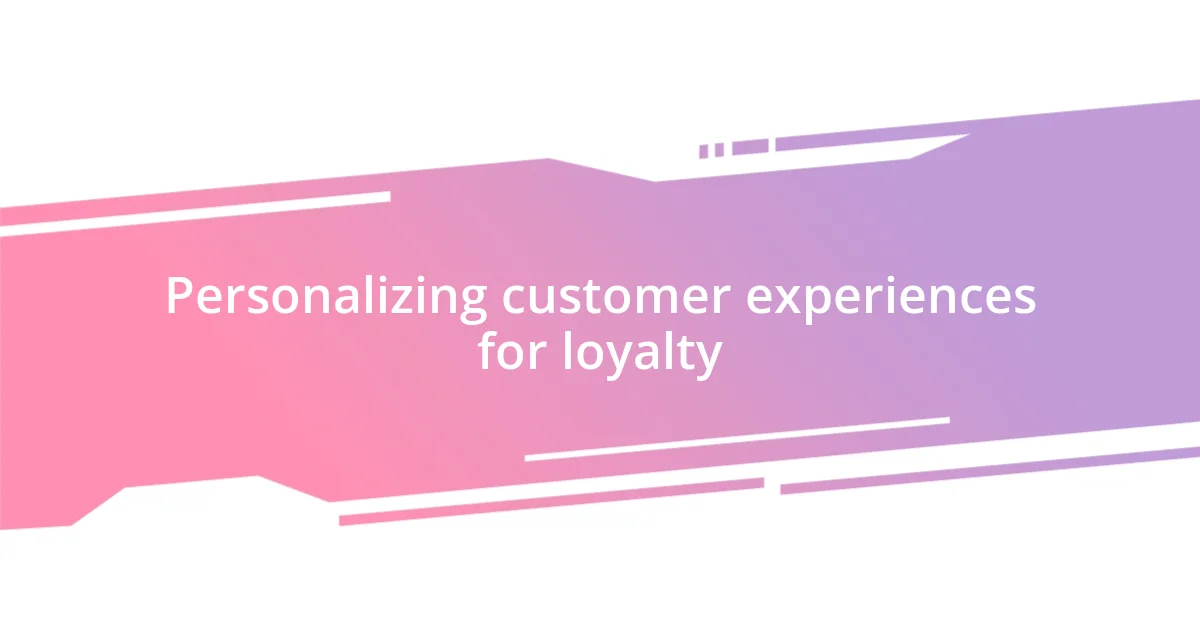
Personalizing customer experiences for loyalty
Personalizing customer experiences is a game-changer in building brand loyalty. I remember the thrill of getting a birthday discount from a favorite brand. It felt as if they celebrated my special day alongside me. Such tailored gestures not only make me feel valued but also create a strong emotional bond, reinforcing my loyalty.
When brands use data to customize interactions, it significantly enhances my shopping experience. For example, I once browsed a skincare website that remembered my previous choices, suggesting products I had yet to try. It felt like they truly understood my skin’s needs, making me much more inclined to explore their offerings. Isn’t it amazing how a little personalization can turn a casual shopper into a dedicated customer?
Moreover, I find that personalized communication, like follow-up emails asking about my experience with a recent purchase, deepens my connection with the brand. Just the other day, a company reached out to see how I liked a gadget I bought. Their thoughtful inquiry not only made me feel appreciated but encouraged me to share my positive experience with friends. Such personal touches turn routine transactions into meaningful relationships, ultimately bolstering loyalty.

Case studies of successful brands
I love studying successful brand loyalty strategies through real-life examples. Take Apple, for instance. They don’t just sell products; they create an entire ecosystem. I still remember unboxing my first iPhone and how it felt like entering a new world. The seamless integration of my other Apple devices made me realize I was a part of something bigger. This connection drives immense loyalty, as customers like myself become invested in the brand and its innovations.
Another great example is Starbucks, which has perfected their loyalty program. I can’t count how many times I’ve visited solely to earn those coveted stars. Their mobile app is a dream come true; I can order ahead and skip the line. Have you noticed how those little rewards build excitement? I often find myself stopping by for a quick coffee just to earn a few more stars, which keeps me engaged and loyal.
Finally, let’s not overlook Nike’s personalized experiences, especially through their NikePlus membership. I vividly remember signing up and receiving custom training plans based on my goals. They made me feel like I was part of a community where my aspirations mattered. When a brand invests in understanding its customers, it fosters a sense of belonging. Have you ever felt that rush of loyalty when a brand goes the extra mile for you? That’s the kind of emotion that solidifies long-lasting relationships.
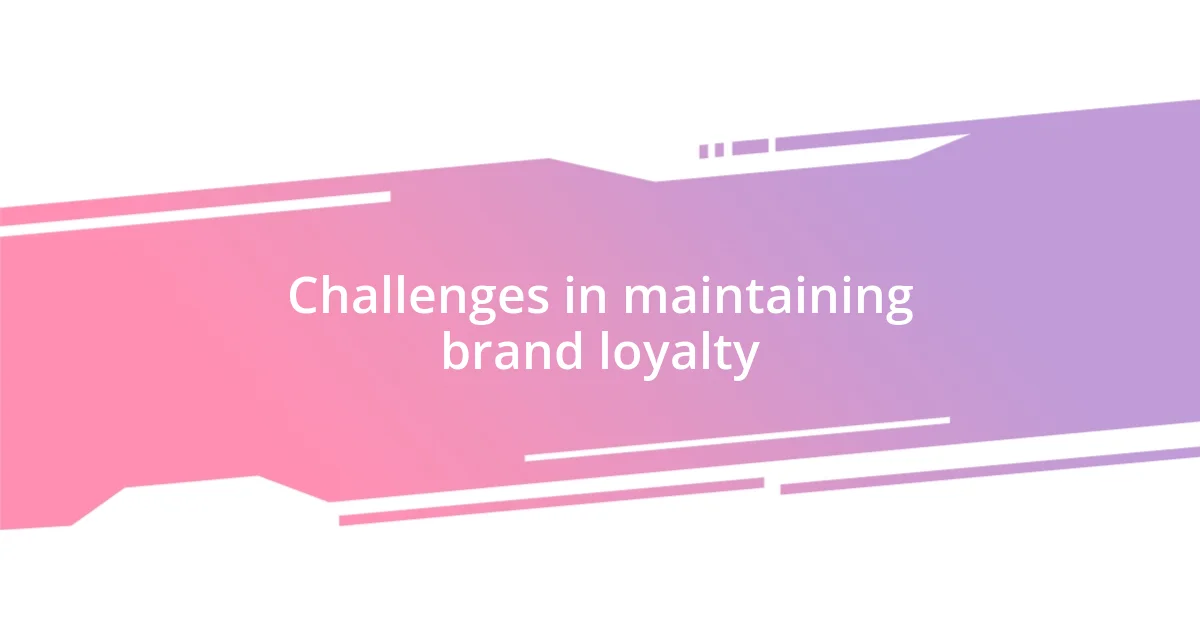
Challenges in maintaining brand loyalty
Maintaining brand loyalty isn’t without its hurdles. One major challenge I often experience is the constant influx of new options. Say I’ve been loyal to a coffee brand for years, but suddenly, a trendy newcomer pops up with artisanal blends and eco-friendly packaging. It’s tempting! This type of competition can make even the most dedicated customers, including myself, rethink our choices.
Another significant struggle is keeping up with consumer expectations. I remember a time when a clothing brand I loved shifted their pricing strategy, raising costs without a clear justification or improvement in quality. Suddenly, I felt undervalued, leading me to search for more transparent alternatives. Have you ever felt that way when a favorite brand changed its formula without warning? That disconnection can easily erode loyalty.
Furthermore, inconsistency in customer service can be a deal-breaker. I still think about the time I had a negative experience with a brand’s support team after a product malfunctioned. Their lack of responsiveness left me frustrated, and I couldn’t help but question whether they truly valued their customers. It’s incredible how one negative interaction can overshadow all those positive experiences, isn’t it? Brands must realize that every touchpoint counts in fostering lasting loyalty.














